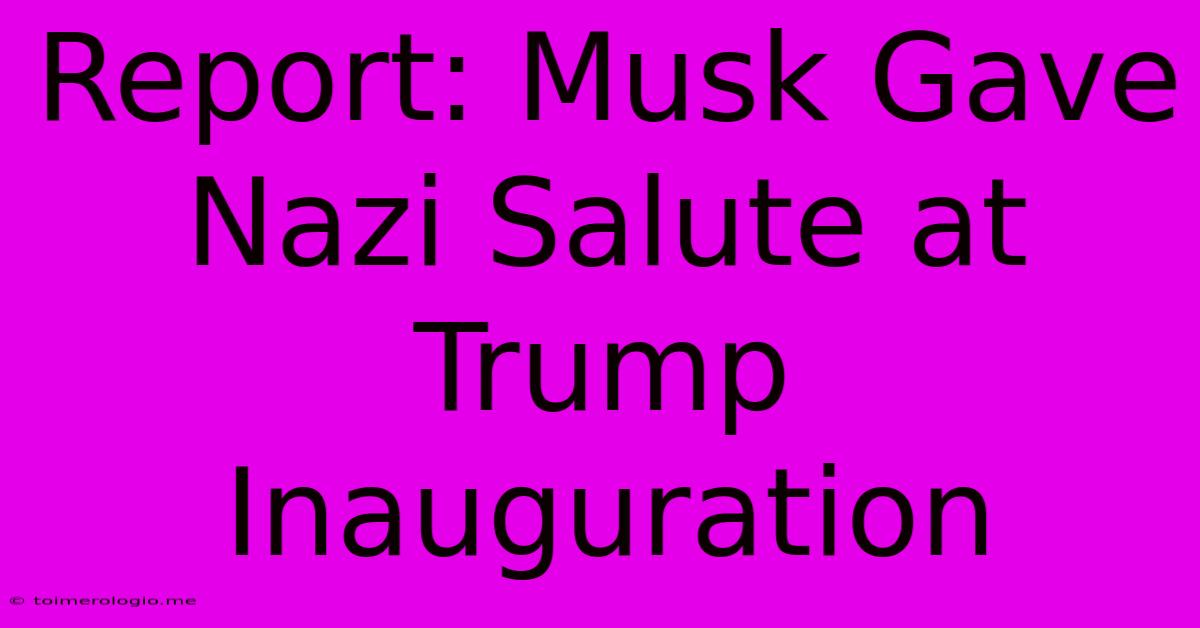Report: Musk Gave Nazi Salute At Trump Inauguration

Discover more detailed and exciting information on our website. Click the link below to start your adventure: Visit Best Website toimerologio.me. Don't miss out!
Table of Contents
Report: Musk Gave Nazi Salute at Trump Inauguration – Fact-Checking a Viral Claim
The internet is a breeding ground for misinformation, and a recent claim alleging that Elon Musk gave a Nazi salute at Donald Trump's inauguration has rapidly spread across social media platforms. This article will delve into the details of this report, analyzing the evidence, scrutinizing the source, and ultimately determining the validity of this explosive claim. The consequences of spreading unsubstantiated allegations, particularly those with such serious historical connotations, are significant and warrant a thorough investigation.
The Allegation: A Viral Image and its Interpretation
The claim centers around a photograph purportedly taken during Trump's inauguration in 2017. The image shows a figure, claimed to be Elon Musk, raising his right arm in a gesture resembling the infamous Nazi salute. This image has been circulating online for years, gaining renewed traction recently due to the resurgence of interest in Musk and his controversial actions. The lack of clear visual evidence – the photo is grainy and taken from a distance – makes definitive identification difficult, fueling both the spread of the claim and skepticism surrounding it.
The Critical Question: Is the figure in the photograph definitively Elon Musk? The answer, based on current available information, is no. While some might argue the resemblance, there is no concrete proof, such as clearer images or eyewitness accounts confirming Musk's presence and actions at that specific location and time. The lack of corroborating evidence casts significant doubt on the claim's veracity.
Analyzing the Source and Spread of Misinformation
A crucial element in assessing the validity of this report is examining its source. Many instances of the image circulating online lack a verifiable origin. This absence of a credible source immediately raises red flags, suggesting potential manipulation or deliberate misinformation. Tracking the image's spread reveals a pattern consistent with the propagation of online conspiracy theories:
- Social Media Amplification: The image is shared predominantly on social media platforms with limited fact-checking mechanisms. This allows it to spread rapidly without scrutiny.
- Lack of Mainstream Media Coverage: Reputable news organizations have not reported on this alleged incident. This is a strong indicator that the claim lacks substantial evidence.
- Echo Chambers: The claim is primarily amplified within echo chambers, reinforcing pre-existing biases and limiting exposure to counter-arguments or fact-checks.
The Importance of Context and Critical Thinking
The gravity of the allegation demands a careful consideration of the context. Accusing a public figure of performing a Nazi salute is a severe accusation with significant implications. Such an act would be a blatant display of support for a regime responsible for unimaginable atrocities. The weight of this accusation necessitates a higher standard of evidence than is currently available.
Critical thinking skills are essential in navigating the digital landscape:
- Verify the Source: Always check the source of information before accepting its validity. Is the source reputable? Does it have a history of bias or misinformation?
- Look for Corroborating Evidence: Does other credible evidence support the claim? Are there multiple sources confirming the information?
- Consider the Context: Does the information make sense within the broader context? Are there alternative explanations?
- Beware of Emotional Appeals: Does the claim rely on emotional manipulation to influence your opinion rather than providing factual evidence?
The Dangers of Spreading False Narratives
The unchecked spread of misinformation, especially concerning such serious topics, has significant consequences:
- Damage to Reputation: False accusations can severely damage the reputation of individuals, even if later proven false. The initial damage can be irreversible.
- Erosion of Trust: The constant flow of misinformation erodes public trust in institutions and legitimate sources of information.
- Social Polarization: False narratives often exacerbate existing social divisions, contributing to polarization and conflict.
- Historical Revisionism: Claims like this can contribute to historical revisionism, minimizing or distorting the significance of past atrocities.
Conclusion: A Lack of Evidence, a Need for Caution
Based on the currently available evidence, the claim that Elon Musk gave a Nazi salute at Trump's inauguration is unsubstantiated and likely false. The lack of credible sources, corroborating evidence, and mainstream media coverage casts serious doubt on the validity of the allegation. The grainy and distant nature of the image itself makes positive identification impossible.
This case serves as a stark reminder of the importance of critical thinking and media literacy in the age of rampant misinformation. Before sharing information online, especially sensational claims, it is crucial to verify its authenticity and consider the potential consequences of spreading unsubstantiated allegations. The spread of false narratives not only damages individuals but also undermines the very fabric of trust and informed public discourse. Therefore, responsible digital citizenship requires a commitment to verifying information and combating the proliferation of misinformation. Always question the source, look for corroboration, and employ critical thinking to navigate the complex information landscape.

Thank you for visiting our website wich cover about Report: Musk Gave Nazi Salute At Trump Inauguration. We hope the information provided has been useful to you. Feel free to contact us if you have any questions or need further assistance. See you next time and dont miss to bookmark.
Also read the following articles
| Article Title | Date |
|---|---|
| Musks Repeated Fascist Salutes | Jan 22, 2025 |
| President Bidens Latest Statement | Jan 22, 2025 |
| Elon Musks Viral Salute Politico | Jan 22, 2025 |
| Trump Inauguration Musks Response | Jan 22, 2025 |
| Nazi Salute Allegation Musk At Trump Inauguration | Jan 22, 2025 |
